FREE Standard Shipping On All Orders $100 or More!*
Natural Swimming Pools
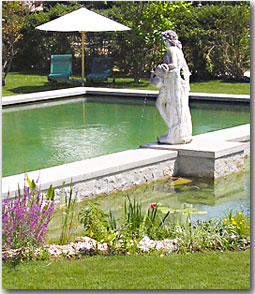
Natural swimming pools use plants and self-contained ecosystems to maintain a clean, natural swimming environment.
A natural pool does not use chlorine, but you still need to maintain water balance, and the filters.
If you've watched any recent episodes of the POOL MASTER, on the animal planet, or have seen pictures floating around the internet about "Natural" pools, you have an idea of what a natural pool is - let's take a deeper dive, shall we?
No Pool Chemicals
Also called "swimming ponds", natural swimming pools use plants and other biological elements to filter and keep the water clean. They require no chlorine to maintain, which is healthier and safer for you and your family as well as the local plants and animals.
Chlorine and other traditional pool chemicals can irritate skin and eyes and even cause other health problems. In natural pools, aquatic vegetation, a circulating water feature and stratified soils are used to filter the water and remove any impurities; naturally!
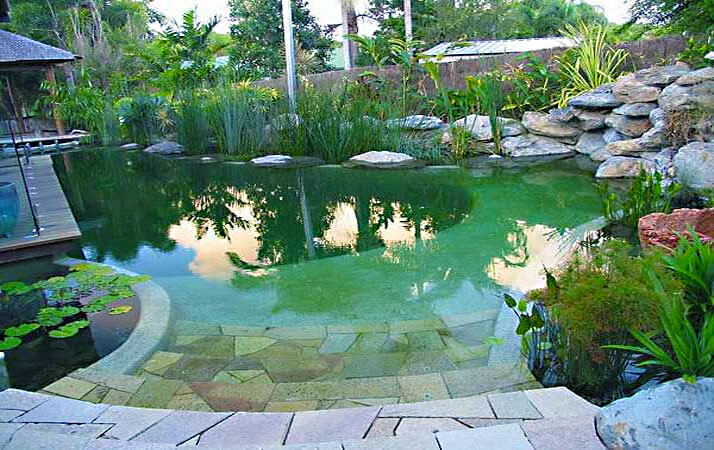
Easier to Maintain
If you use a designer, natural pools cost about the same as a traditional pool, according to HouseLogic. However, the annual cost of maintaining a natural pool can be less than a traditional pool, because the natural pool maintains itself without the need for traditional equipment, chemicals or cleaners.
Because natural pools use aquatic vegetation to filter the water, you don’t have to do a lot of laborious maintenance, either. A small amount of brushing and skimming to remove leaves and occasional clean-up around the plants is all you really have to do. Natural pools will take on a naturally healthy water balance, and there's no need to constantly test and adjust water balance to protect surfaces or equipment.
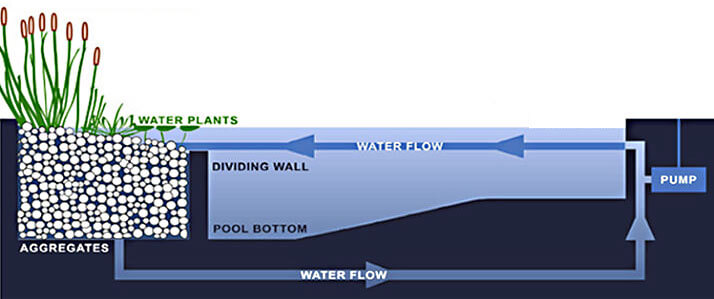
Many natural pools have built-in natural skimmers, but there is no traditional filter that requires maintenance and repair. Instead, there is only a pump, which draws the water from the pool and floods it into large area of specially stratified layers of soil and rock, using the surrounding flood plain as a natural filter!
And forget about the thousands of dollars snow belt pool owners spend each year on winterizing services and products. Most pumps are submerged, or in sumps, so winterization is not a concern. For natural pools in milder climates, the pump can be run just a few hours per day in winter.
Environmentally Friendly
One of the main benefits of natural swimming pools is the beneficial impact they have on the environment and native landscapes. According to Permaculture Magazine, traditional swimming pool owners drain about 20,000 gallons of chemical-filled water into the environment each year. Natural pools never have to be drained, and the water is clean and free of harmful byproducts.

Natural pools can be safer for any wildlife that might come across your yard, and they can attract native and endangered plants and microorganisms. Turtles and frogs, butterflies and dragonflies will all make a natural pool a home.
The best part about natural swimming pools? They work with the environment instead of against it to provide a safe and beneficial addition to your native landscape. Plus, you can re-create the environment with new plants each year, and be an aquatic gardener!
Customizable and Personal
Natural pools can fit into any space and environment. The shape and size can be customized to your yard, and the plants and other features can be tailored to your native landscape and plants. Natural pools can be heated, but most are heated naturally, by the sun only.
Have fun choosing aquatic plants that you like, those that grow below water, and those that grow above the water line. You could add a water feature like a fountain and a wooden dock or walkway around the edges of the pool. If it gets cold enough in your region in the winter, natural pools freeze over just like ponds do, providing you and your family with a small ice-skating area.
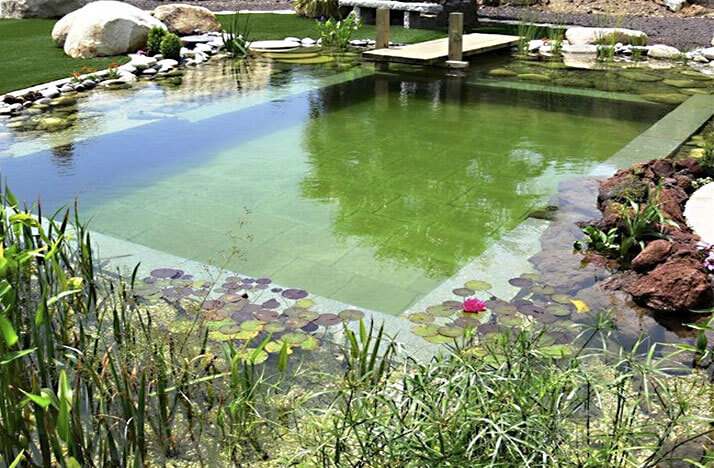
The materials used for a the swimming area of a natural pool can be varied. Some companies use heavy gauge pond liners, or pre-fab fiberglass or thermoplastic shells. Other companies lay down a floor of gunite, which can be topped with natural stone, with beautiful effect, as shown below.
Before you think it's only suited for a small backyard pond, or for southern climates, at Webber Park Pool they have opened a huge public natural pool - the first of it's kind. At 660,000 gallons, it's not small, and in Minnesota, it's not in the South!
Let's take a look at some common questions surrounding natural swimming pools.
ARE NATURAL POOLS SAFE TO SWIM IN?
Absolutely! From a biological perspective, natural pools are quite sanitary. There are hundreds of public natural swimming pools, which operate within new standards created specifically for managing the health of a natural pool. The biofilter, or regeneration zone, traps and absorbs bacteria and germs, while aquatic plants suck up phosphates and other micro-contaminants, while releasing oxygen into the water. Water balance is decidedly different than in a traditional pool. pH levels in natural pools are run quite low, 6.5-7.0, which retards most algae and bacteria growth, and is preferred by the aquatic plants that are planted in the regeneration zone.
CAN A NATURAL POOL BE WINTERIZED?
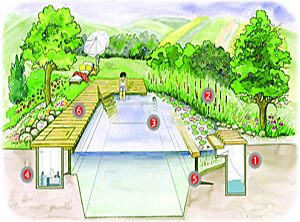
In some cases, there is no need to "winterize", as one would do with a traditional pool, since natural pools don't use traditional aboveground equipment. Where a submersible pump is used, a winterization process is simpler. With systems using aboveground equipment, or pipes near the surface, draining the equipment and blowing the pipes is recommended. Natural pools can be covered with a winter cover or mesh net to keep it clean. Plants in the regeneration zone can be cut-back and also net-covered if needed to keep out leaves and debris.
CAN FISH OR TURTLES LIVE IN A NATURAL POOL?
They can, but they must be kept in the swimming area, and not in the regeneration zone, and they cannot be fed any type of packaged food. Koi ponds require slight differences in water management, and most natural pools are designed to be a fish-free zone, and although fish can survive and thrive in a natural pool, it is not recommended as they consume vital microbes and add a considerable amount of contaminants to the water. Ducks and other water fowl are also discouraged, because they eat the plants and do their business in the water.
HOW DOES A NATURAL POOL FILTER WORK?
The regeneration zone as it's called, is an area as large as the pool itself, or as large as the swimming area. Water is pumped from the swimming area, to the top of a natural pool filter that spreads out over hundreds of square feet and is 3-5 feet deep, graded with a mix of gravel, sand and natural minerals to filter and purify the water, just as it's done in nature.
DO NATURAL POOLS ATTRACT CRITTERS AND SKEETERS?
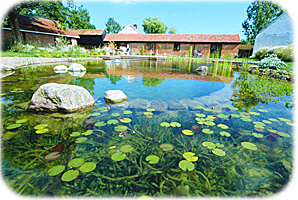
Due to the natural lagoon like effect, a natural pool may attract certain amphibians like frogs or woodland creatures, water fowl or turtles. Most snakes do not like water, however they may be found near the edges of a regeneration zone. Mosquitos (skeeters), won't lay eggs in a natural pool because it is water in motion, and not a stagnant pond. One of the best things about a natural pool, according to its proponents, is the harmony and co-existence with nature.
ARE NATURAL POOLS REALLY CHEMICAL-FREE?
Yes, there are no disinfectants or sanitizers used in a natural pool. Ozone, UV and mineral purifiers are also not used in a truly natural pool. No algaecides, no clarifiers and certainly no chlorine, all of which will destroy the natural equilibrium of the system. Natural pools do still need effective levels of pH, alkalinity and calcium hardness, and may need additions of these water balance chemicals. Pool enzymes can be used as well - without additives.
HOW MUCH DO NATURAL POOLS COST?
They cost more than a normal pool, in most cases. This is primarily due to the space required for the regeneration zone, and the depth of the swimming area, recommended to be 4-6 feet. The average price for a residential-sized natural pool would be $50-$75K, and that's if you have a builder near you that offers natural pools. If you have to hire an out of town contractor, this will increase the price.
SPACE REQUIREMENTS
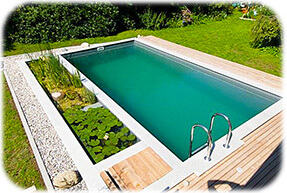
A natural pool will require more space than a traditional pool, because for best results the regeneration area should be almost as large as the swimming area.
However, if space is a consideration, the natural filter ore regeneration zone can be deeper and more compact, as shown in this image on the right by Avalon Landscapes, which has melded traditional and natural pool designs quite nicely.
CLIMATE REQUIREMENTS
Natural pools can be built in nearly all climate zones, and in snowbelt regions of the US, natural pools will freeze just as any pool will, solid across the surface during winter months. Some aquatic plants that don't survive winter will need to be replaced each spring. In Minnesota, a natural pool of over 21,000 sq. ft. is currently being constructed, and in the winter, they plan to use the natural pool as an outdoor ice skating rink.
WATER REQUIREMENTS
Evaporation is accelerated in a natural pool due to the respiration of the plants. Rainy periods may provide enough to compensate, but during hot and dry months, the natural pool will need to have water added from your garden hose to maintain the water level. Normal tap water is fine, although a garden hose water filter is recommended to remove chlorine, metals and bacteria.
MAINTENANCE REQUIREMENTS
It takes a few seasons for the natural equilibrium to take hold, which improves natural filtering and cleanliness of the water. Brushing and netting of the natural pool is an ongoing bit of maintenance, to keep surfaces of the swimming area clean, and to remove debris from the regeneration zone.
Put on your muck boots, cleaning a natural pool filter is much like weeding a garden, only you are standing in 6 inches of water. Every month or two, the plants should be trimmed of any dead leaves, and the floor around the plants cleaned of any sticks or leaves.
SAFETY REQUIREMENTS
Just like any other pool, a natural pool will require a safety fence that conforms to local standards. The electrical equipment, such as the pump and lighting, should be installed in accordance with NEC 680 and any local codes governing bonding. Since most natural pools are too shallow for safe diving, diving boards or dive rocks are discouraged without proper engineering. Pool alarms can be used for natural pools, but may not be as effective as secondary fencing or other access restrictions.